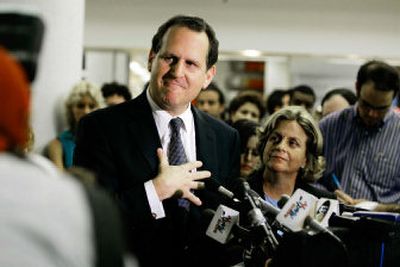Congress working on funds for Cuba

WASHINGTON – The White House and Congress, caught unaware by Fidel Castro’s illness, prepared Wednesday for a possible showdown in Cuba as lawmakers drafted legislation that would pay millions of dollars to dissidents who fight for democratic change.
“The message will be: The United States stands with you,” Sen. Bill Nelson, D-Fla., one of the authors, said in an interview. “Be ready to assert your independence.”
There was no sign of upheaval in Cuba on Wednesday, two days after Castro stunned U.S. officials and many of his own countrymen with the news that he had temporarily ceded power to his brother, Raul, in order to undergo surgery.
Neither were there updates on Castro’s medical condition, which he described in a brief statement Tuesday as stable. Raul Castro has not appeared publicly since Monday.
The handover was a surprise to the White House and Congress, one senator said.
“The president’s comment was that everybody was caught by surprise, and we’ll have to wait and see” what U.S. action is necessary, said Sen. Robert Bennett, R-Utah, who discussed the developments with President Bush on Tuesday.
The remarks underscored the scanty reliable intelligence the U.S. has on an old Cold War foe that lies just 90 miles off the Florida shore.
“It’s difficult for us to assess what the situation is,” said White House spokesman Tony Snow. He cautioned Cubans against any mass exodus – and Cuban-American exiles against returning to claim property they lost in Cuba.
“Stay where you are. This is not a time for people to try to be getting in the water and going either way,” Snow added.
At the State Department, spokesman Sean McCormack said the United States had no independent information about Castro’s health. “This is a pretty closed decision-making circle and it’s very opaque as to what is actually going on,” he said.
For now, administration officials and members of Congress were focused on offering dissidents cash for fighting for democratic change.
Legislation sponsored by Nelson, fellow Floridian Mel Martinez, Majority Leader Bill Frist and others would authorize as much as $80 million over two years – and pay half that almost immediately – to dissidents and non-governmental organizations on the island.
Recommended by a presidential commission three weeks ago, the legislation says those eligible for the money would include political prisoners, workers rights organizations, independent libraries, journalists, doctors and economists.
Meanwhile, the House’s three Cuban-American members, Republican Reps. Lincoln and Mario Diaz-Balart and Ileana Ros-Lehtinen, discussed the issue early Wednesday with members of Bush’s National Security Council before boarding a flight to Miami.
Some U.S. officials fear that post-Castro instability in Cuba could lead to a large-scale migration by Cubans to South Florida, similar to those in 1980 and 1994.